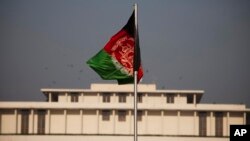With several recent high-level visits to Islamabad from global trading partners, including nearby Iran, Pakistani officials are indicating they want to increase business with Afghanistan.
The officials say they have taken significant steps in recent years to facilitate landlocked Afghanistan’s trade, but insist the neighboring country’s opposition to regulation of cross-border flows of people and commercial goods continues to hamper expansion in bilateral trade and transport.
Afghanistan has conducted its global trade through Pakistani sea port facilities under a 1965 bilateral treaty that was renegotiated in 2010 in a mutual bid to address tensions and reduce acrimony. Currently, there are only two border crossings open for trade, Torkham in the northwest and Chaman in southwestern Pakistan.
Afghan authorities have long accused Pakistan of not allowing free movement of transit and trade and that Islamabad has not delivered on commitments to remove impediments.
Pakistani officials say illegal trade in the guise of legitimate business is impacting the national economy. They say despite challenges, the steps they have taken to facilitate trade with Afghanistan have increased container shipments between the two countries from 40,000 in 2014 to 50,000 last year.
Pakistani Commerce Minister Khurram Dastgir Khan says his government has reduced scanning of trucks transporting Afghan imports and exports through its territory. He says Afghan containers carrying perishable goods, mainly fruits and vegetables, are allowed full access to the Pakistani border with India and to the Karachi seaport to facilitate fast movement.
The minister adds that on the way back, Afghan trucks are allowed to take Pakistani exports to Afghanistan so they can justify their trip economically. He adds Islamabad has also reduced the percentage of scanning of Afghan transit trade from 100 percent to 20 percent.
"The difficult issue is that we feel that any effort by Pakistan to regulate the flow of goods and people across our border with Afghanistan is resisted by Afghanistan," said Khan.
Pakistani officials estimate up to 50,000 people move across the border with Afghanistan every day. While official formal trade volume is around $2 billion, conservative estimates put the volume of informal trade at nearly $3 billion.
“Both countries have formal agreements on customs information sharing, but this is something that sooner or later we will have to do by mutual agreement that this flow of people, which is in the tens of thousands each day, we will have to regulate it. Similarly, the flow of goods, a part of which is formal, but a large part of it is also informal, will have to be regulated,” Khan noted.
The two countries share a 2,500-kilometer porous border that encourages militants to move back and forth without detection.
Afghan authorities allege leaders of the Taliban are using Pakistan to direct insurgent activities on their side of the border, while Pakistani officials say anti-state militants sheltering in Afghanistan are behind terrorist attacks in their country.
The border, called the Durand Line, was established more than century ago during British rule. Kabul does not recognize the boundary as an international frontier and insists strict border controls will further divide Pashtun tribes on both sides.
Afghan Minster of Commerce Humayoon Rasaw said he believes that both countries need to deal with trade and security issues separately.
“Once we build the [mutual] trust and increase our trade I think it will affect the security section also. We are very keen to increase our bilateral trade with Pakistan. Pakistan is also one of the biggest partners for us and we are going to further increase that," the Afghan minister told VOA.
"So once we solve the issues of transit and very small [other] issues that we have, then I think that will also contribute in the peace and stability in the region," he added.
Afghanistan has also been demanding inclusion of India in the transit trade agreement with Pakistan to be able to directly export and import Indian products.
Pakistani businesses and industries say that would give India the same advantage of short distance that Pakistan is enjoying and would reduce the competitiveness of Pakistani goods being exported to Afghanistan and on to Central Asian countries.
Several of those involved, like former Pakistani Commerce Minister, Mohammad Zubair, say Afghanistan and Pakistan can improve trade if they follow best international practices to address problems.
“This approach will lower tensions, reduce acrimony and further trade in the interest of both countries. The gains in this are not just in the context of the bilateral trade, but will help the regional trade,” Zubair noted.




